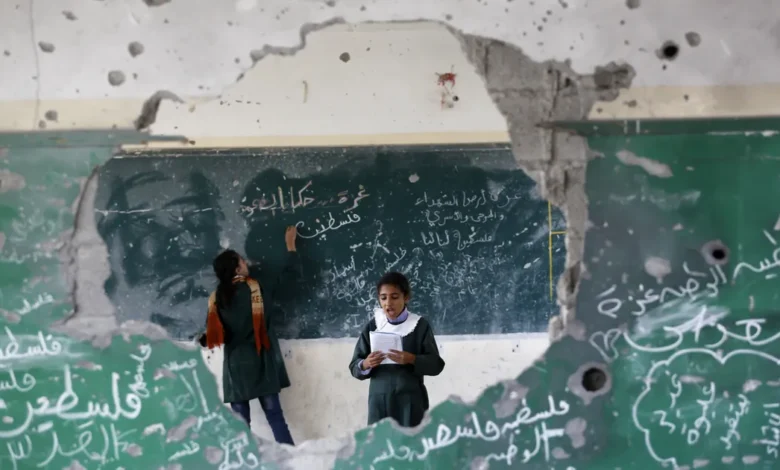Gaza’s High School students’ dreams on hold
Wednesday - 26-6-2024 - 9:34 AM

By : Najla M. Shahwan
On a day that should have marked a significant landmark for around 89,000 Tawjihi high school students in Palestine, only 56% of them were able to sit for their final exams.
The Palestinian Ministry of Education announced recently that the ongoing Israeli military offensive has deprived approximately 39,000 students in the Gaza Strip of their right to sit for the Tawjihi high school final exams, which were scheduled to commence on June 22.
The ongoing Israeli offensive on Gaza, now in its nine months , has severely impacted the education sector, with devastating consequences for thousands of students and their families.
Many have been directly affected by the aggression, either losing their lives or having their education disrupted due to the destruction of schools and other educational infrastructure.
The Palestinian Ministry of Education and Higher Education reported that 430 high school students in Gaza and 20 in the West Bank have been killed by Israeli troops since the academic year began in August.
Statistics from the Ministry paint a grim picture as at least 8,000 school-aged children and 350 teachers have been killed in Gaza. Additionally, there are over 12,500 injured students, 2,500 of whom have sustained disabilities.
These numbers highlight the profound human cost of the war and its impact on the education system.
Sadiq Khadour, the Assistant Undersecretary for Student Affairs and Ministry spokesperson, detailed the extensive damage to Gaza's educational infrastructure.
Of the 307 government school buildings, he said, 286 have been damaged to varying degrees, with dozens completely destroyed.
Moreover, 150 out of 228 schools operated by the United Nations Relief and Works Agency (UNRWA) have been targeted, with many serving as shelters to house the majority of the displaced families in Gaza, most of whom are living in miserable conditions.
Khadour emphasized that these statistics, alarming as they are, represent only quantifiable damage. The qualitative impact, such as the educational loss from students being unable to attend school, is harder to measure but equally devastating.
The destruction extends beyond buildings to include vital communication and electrical networks, making the prospect of shifting to online education unfeasible in the near future.
Currently, 630,000 students in Gaza are deprived of their right to education, including those in government, UNRWA, and private schools, as well as 88,000 university students and 80,000 kindergarten-aged children.
This widespread disruption of education prompted 19 UN experts and rapporteurs to condemn the destruction as a deliberate attempt to dismantle the Palestinian education system, referring to it as "educational genocide."
In a joint statement, these experts highlighted that these attacks are not isolated incidents but part of a systematic pattern of violence aimed at undermining the foundations of Palestinian society. They poignantly remarked, "When schools are destroyed, hopes and dreams are destroyed as well."
The war has devasted Gaza’s education system, which was already struggling after 17 years of blockade , several wars and escalations combined with recurrent conflict have damaged and destroyed an already fragile education infrastructure by increasing pressure on education facilities, disrupting education provision, and impacting the psychosocial wellbeing of children and teachers , exacerbating the already dire humanitarian situation.
According to the Ministry of Education, as of 2 April, more than 5,479 students and 261 teachers have been killed in the Gaza Strip since 7 October.
However, the Education Cluster , part of the United Nations humanitarian coordination forum, estimated that as of 30 March, 87.7% of all school buildings in Gaza have been damaged or destroyed.
More than 76 percent of schools in Gaza require rebuilding and major rehabilitation to become functional after Israel’s monthslong offensive, according to UNRWA, which operates many schools in the Gaza Strip.
The Israeli attacks have been even more devastating on Gaza’s higher education system, destroying or severely damaging
All of Gaza’s 12 universities and Israeli forces also killed 100 academics, completely disrupting university education according to the United Nations.
Israel’s huge destruction of schools and universities demonstrates the devastating, lasting impact on a generation of children's learning. Their learning has already been cut-off due to this war , but once hostilities cease, they will have no schools to return to.
When children are out of school for a long period, their learning does not just stop but is also likely to regress and the longer children are out of school, the greater the risk that they do not return.
This risks their prospects in the longer-term, including their income, their mental and physical health, while they may also be at greater risk from violence and abuse.
The destruction of the educational system in Gaza not only denies the Palestinian people their right to an education, but also jeopardizes their Palestinian society’s intellectual and human capital.
It stifles the potential and ambitions of Palestinian people by methodically eliminating teachers and pupils, thereby extending a cycle of control and oppression.
By concentrating on faculties and universities, Israel not only bodily dismantles the infrastructure, it also targets Palestinian national identity and its history.
This intentional destruction denies Palestinian’s satisfactory education, perpetuating a cycle of educational deprivation and marginalization and hindering their ability to build a brighter future and the collective advancement and development of the Palestinian society as a whole.
An immediate and definitive ceasefire is needed and the international community must act now for a permanent and definitive ceasefire.
Hope dies when a parent or child can no longer imagine their future and fulfil their rights. Their hopes must be kept alive !
Najla M. Shahwan is Palestinian author, researcher and freelance journalist. Author of 13 books in literature and a children story collection .She is also Chairwoman of the Palestinian Center for Children’s Literature ( PCCL ) , founder of Jana Woman Cultural Magazine and Recipient of two prizes from the Palestinian Union of Writers.

